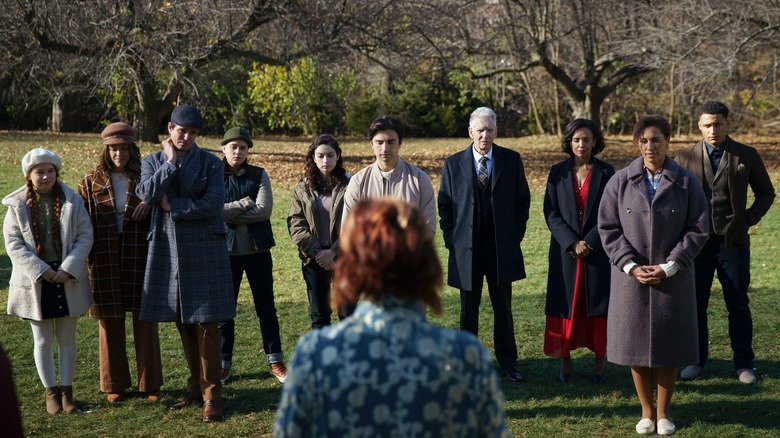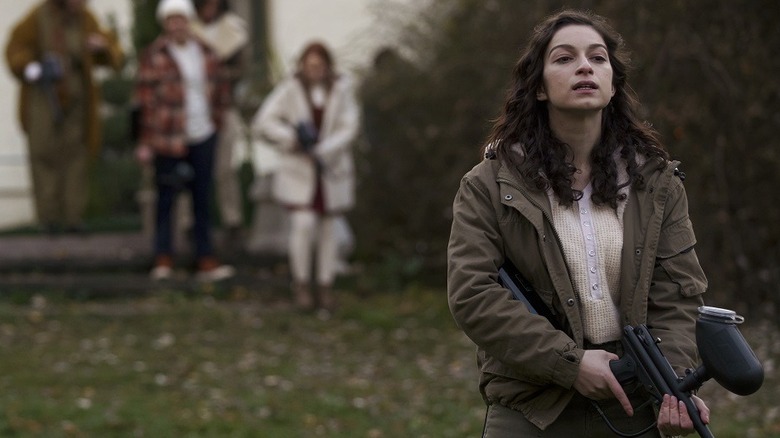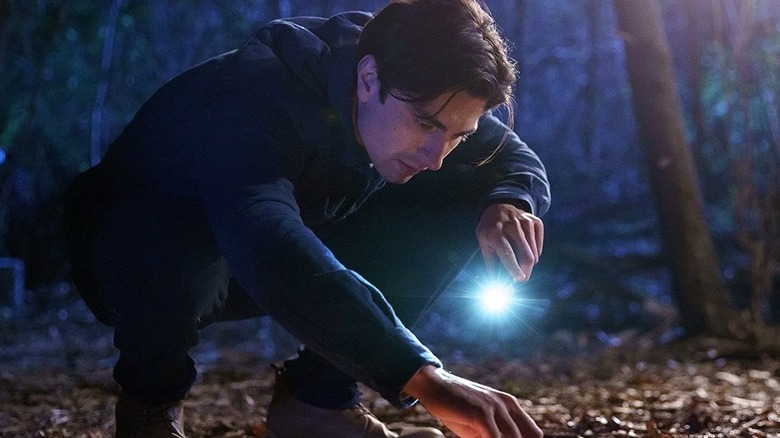The Ending Of Slasher: Flesh And Blood Explained
For the past four seasons, Shudder's eight-episode limited horror series, "Slasher," has been living up to its name — and then some. The Canadian series was created by Aaron Martin (of "Degrassi: The Next Generation"), and although its been repeatedly compared to its U.S. counterpart, "American Horror Story," the two have very little in common past the fact that both shows re-use the same core cast of actors. Even "American Horror Story: 1984" — Ryan Murphy's actual slasher season — bears little resemblance to what Martin's been up to north of the border. Although "Slasher," like "AHS," isn't afraid to engage in a little social commentary — with Season 3, "Slasher: Solstice," being the most straightforward and direct about these motivations — it does so in a way that's decidedly unique.
In fact, there are two distinct ways to view and interpret "Slasher: Flesh and Blood," and it doesn't appear Martin necessarily has a preference. With its over-the-top archetypes and one-dimensional characters (or, caricatures, really) of the hyper wealthy, its almost comedically gruesome deaths, and an utterly irrational plot that requires an immense suspension of disbelief, "Flesh and Blood" can easily be viewed as the horror equivalent of a Danielle Steele novel. In other words, if you're there for empty horror calories, jump scares, and gore, Season 4 has you covered.
If, however, you prefer to view the season as a kind of allegory or morality play, it doesn't take a whole lot of mental gymnastics to key-in on the various themes and subtext at play. Never is this "choose your own interpretation adventure" more apparent than in the season finale of "Slasher: Flesh and Blood," titled "Kindred."
Slasher: Flesh and Blood teaches an old trope new tricks
"Slasher: Flesh and Blood" takes the "rich people are terrifying" trope to an extreme that surpasses even films such as "Ready or Not" and "Knives Out." The basic premise of the season is thus: An eclectic, imbalanced, extraordinarily wealthy family (for whom the term "dysfunctional" isn't nearly enough) gathers on a remote rich person island to tend to their obligatory visit with sociopathic patriarch, Spencer Galloway (David Cronenberg). Spencer announces that he's going to usher in his own impending death, and leaves his nurse/suicide assistant in charge of doling out his inheritance.
Though the family is used to competing in an aggressive and dangerous game at each reunion in order to win Spencer's "prize" that year, now that he's leaving his entire inheritance to just one winner, the stakes have never been higher, and the game has never been more dangerous (Again, think "Knives Out," but with a torturous obstacle course thrown in the mix that involves things like avoiding getting electrocuted or smushed between walls a la the garbage compactor in "Star Wars Episode IV").
For some reason (lots and lots of money is the reason), the "grieving" family members decide to battle it out to the death on the island, despite the fact that a masked killer in a plague doctor-meets-phantom of the opera costume is running around taking players out one by one. Basically, it's your average "this is what rich people do in their spare time" thriller. While the first seven episodes push viewers to the absolute breaking point in terms of believability, the finale not only sheds light on the rest of the season and each of its characters' motivations, it also reveals exactly what the fourth iteration of "Slasher" is using those characters to say.
Slasher: Flesh and Blood has no good guys, only winners
In what feels almost revolutionary in terms of its rejection of typical horror mechanics, "Flesh and Blood" doesn't give viewers a true proxy in the narrative. Even the few characters who appear somewhat rational and morally relatable are, in the finale, revealed to be every bit as self-righteous, cutthroat, and delusional as their exaggerated counterparts.
Theo Galloway (Alex Ozerov) and Liv Galloway (Sydney Meyer) are kissing cousins who — aside from the whole sexual tension thing — act for several episodes as the level-headed voices of reason amidst all the blood-lust and chaos. Theo is your typical Nice Guy who repeatedly attempts to bring the increasingly paranoid group to their senses (you know, the one who says, "We have to stick together! We can't turn on each other!"), while Liv is the underdog Final Girl whose lower socio-economic status and military background endear her to viewers from the get-go.
In the finale, however, we learn that Theo is every bit as classist and narcissistic as his insufferable "artist" mother Florence (Sabrina Grdevich) and that Liv is perhaps the most Galloway of all, despite the fact that she had no knowledge of her heritage prior to Spencer's death. (As it happens, Theo's closeted uncle is actually Liv's father. Her mother was the Galloway's maid.) By taking the only two potentially moralistic characters and having them turn on one another in the finale, Martin forces viewers to reconcile with the fact that, at a certain point, wealth and greed turn even the most virtuous among us into absolute monsters.
Flesh and Blood speaks to two motivations for violence
There are two ways to die in "Slasher: Flesh and Blood." One is, of course, by being taken out in exceedingly creative and gruesome ways by the island's masked killer. The other is by having one of your "family" members turn on you in the crucible of claustrophobia and paranoia that the island and Spencer's game create. For the most part, these two ways are connected: Often, a family member is left vulnerable after having been turned on, and that's when the killer strikes. The finale's reveal of just who the killer is, however, speaks to an entirely different dichotomy.
Though Spencer's doctor assistant, Persephone Trinh (Jeananne Goossen), is thought to have been killed off by Florence in a much earlier episode, "Kindred" reveals that she not only survived, but that Florence (ugh, Florence) was correct in her suspicions: Dr.Trinh is the masked killer. Rather than go the usual route of giving the murderer an elaborate backstory and arguable justification for her actions, "Flesh and Blood" gives viewers little to go on when it comes to Dr. Trinh. Essentially, she kills because to her, it's just good fun. While it's true that Spencer paid her to terrorize and kill off his potential heirs, the good doctor delights in her work for reasons that have nothing to do with cold, hard cash.
The series uses Dr. Trinh as a foil to Final Girl Liv Galloway. The former appears suspicious, but at least her motivations are (in context, and, however horrific) somewhat "pure," and the latter appears trustworthy, almost relatable, but her motivations turn out to be a toxic blend of obtaining wealth and exacting revenge for The Galloways' previous rejection of her as a member of the family. In other words, some people kill for the fun of it, and some do it as a means to an end.
Slasher: Flesh and Blood has some things to say about Capitalism
The notion that super rich are different from the rest of us isn't just a horror trope, it's a widely-held notion, and one that's been studied at-length (via Psychology Today). What Martin appears to be doing with "Slasher: Flesh and Blood" is take that trope and expand it to speak to capitalism in general, as opposed to the "symptoms" of capitalism, such as extreme economic inequality.
It's all but impossible to take the one-dimensional, comedically exaggerated characters in "Flesh and Blood" seriously, to the point where it becomes clear we're not meant to do so. (Of course, it could just be shoddy/tonally inconsistent writing, as TV Fanatic suggests, but let's give the show the benefit of the doubt.) "Slasher: Flesh and Blood" asks viewers to accept these rich lunatics as representative of a society that places wealth and equity above health and ethics.
The finale drives this point home with an especially dark twist: that is, that while wealth obtained through violence begets wealth obtained through violence — and while the machinery of capitalism crushes 99% of the society that embraces it in its gears — that 99% is every bit as capable of getting caught up in the "game." It isn't a cutthroat, privileged, rich kid Galloway that comes out on top by outlasting everyone around her, it's Liv: the one character who appears to share no traits whatsoever in common with the rest of the family.
In a sense, Episode 8 of "Flesh and Blood" asks audiences to question their own part in the unstoppable, un-killable villain that capitalism can be. What appears to be a "poor kid makes good" fable is actually an indictment of how the desire to be part of the 1% is as integral to the perpetual momentum of capitalist greed as the apathy of those already at the top.




